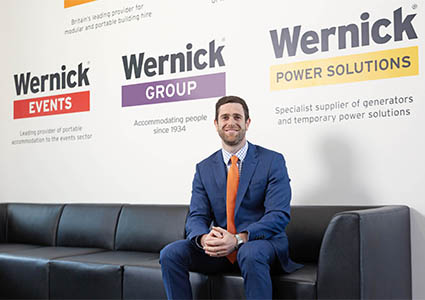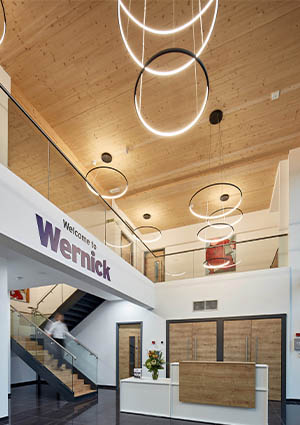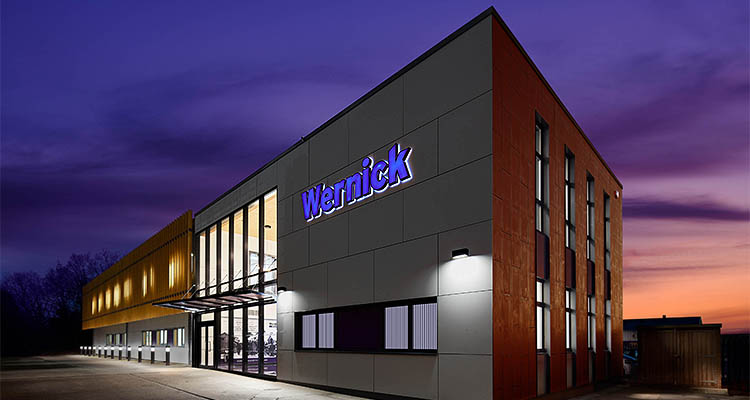From chicken crates to modular solutions: Wernick’s inspiring journey to success
With a proud history dating back to 1934, the Wernick Group (Wernick) stands as Britain’s largest independent manufacturer and hirer of portable and modular buildings, site accommodations, and off-grid power solutions. Through a series of strategic acquisitions, the company has further propelled its growth over the last decade. Its experienced team is dedicated to creating customised solutions tailored to meet each client’s unique requirements by taking the time to listen to and understand their needs, assess their sites, and provide expert advice. Jonathan Wernick, CEO and great grandson of founder Samuel (Sam) Wernick, retraces the company’s journey from its early days.

“Prior to establishing Wernick 90 years ago, my great grandfather Sam was working as a poultry dealer, transporting chickens from farms to butchers inside homemade timber crates. One day, an interested farmer asked him where the crates came from, and Sam revealed that he had built them himself. The farmer then requested him to make and sell him a few crates, marking the start of a new venture for Sam. Quickly, Sam realised that he was making more money from selling the crates than from dealing chickens. As a result, he focused exclusively on manufacturing timber products, more specifically timber buildings, thus marking the genesis of Wernick. During the 1940s to the 1960s, the company experienced uninterrupted growth by providing timber buildings, such as chicken coops, pigsties, and small greenhouses for the agricultural sector. Leveraging this success, it expanded into other markets, manufacturing garden sheds for the domestic sector, for example. In the 1970s, Wernick entered the education and healthcare sectors, crafting smaller classroom and doctor surgery buildings with timber frames. Importantly, this decade also saw the birth of the company’s hire division, enabling it to rent out its timber buildings to the construction and education industries, among other sectors.
“Upon acquiring a few businesses in the 1980s, we shifted our focus from timber buildings to steel framed modular buildings, which is more akin to what we manufacture today. From 1995 onwards, we become very acquisitive, beginning with the purchase of Hallam Hire. To date, we have acquired around 37 companies and experienced dramatic growth. Starting at £12 million in 1993, our turnover reached £33 million ten years later and £80 million after another decade. These acquisitions turned a good-sized family business into a major player in the modular portable building industry and a nationally renowned brand. Over the last five years, we have doubled in size, and we now boast three hire businesses and three manufacturing businesses across 45 locations throughout England, Scotland, and Wales,” he adds.
Career opportunities
To accommodate this remarkable growth and its 950 employees, Wernick is relentlessly investing in new sites and additional space, as Jonathan highlights: “As demand for our products continues to rise, we require significantly more operational, storage, and office space to accommodate it. Therefore, our programme of depot and office upgrades will not cease as long as we keep growing. In fact, owning the sites we operate from is a core strength of our business, as it allows us to confidently invest as much as we want in our sites without the risk of ever being evicted by a landlord. This year alone, we are set to spend around £30 million on buying new depots, upgrading existing ones, or building new offices or workshops. Delivering great solutions to our customers would not be possible without having the necessary foundations in place, which include our depots, offices, and factories, but also our engaged workforce,” he enlightens.
demand for our products continues to rise, we require significantly more operational, storage, and office space to accommodate it. Therefore, our programme of depot and office upgrades will not cease as long as we keep growing. In fact, owning the sites we operate from is a core strength of our business, as it allows us to confidently invest as much as we want in our sites without the risk of ever being evicted by a landlord. This year alone, we are set to spend around £30 million on buying new depots, upgrading existing ones, or building new offices or workshops. Delivering great solutions to our customers would not be possible without having the necessary foundations in place, which include our depots, offices, and factories, but also our engaged workforce,” he enlightens.
Passionately enthusiastic about the vital role of his employees, Jonathan sheds light on the strategies implemented within Wernick to attract and retain staff. “Just over 20 percent of our staff have been with us for more than ten years, which demonstrates our commitment to retaining our people. At Wernick, this entails providing career progression through training, creating enjoyable working environments, fostering a positive culture, and ensuring that everyone has the necessary tools to perform their jobs to the highest possible standards. Taking care of our staff is a top priority for us, especially considering that engaged teams are essential to delivering the best results for our customers. Hence, if we did not get the engagement piece right, we would not be able to deliver high-quality products or services. When it comes to recruitment, every business has to offer a competitive package to attract talent, however it’s also important having a great reputation and being ambitious. People often enjoy being part of a growing organisation that is constantly seeking to improve, as it usually presents them with opportunities for career progression in the future. We understand that reputation is closely tied to our existing staff, as word of mouth can impact our image. Therefore, treating our employees well is crucial for attracting new talent,” he expresses.
Smart technologies
Turning to sustainability, Jonathan shares the initiatives undertaken by Wernick not only to lower its own carbon footprint, but also that of its clients. “Two years ago, we made a commitment of achieving Net Zero by 2040, and we are investing significantly towards this goal. We began by measuring all our Scope 1, 2, and 3 emissions every month, which we have now streamlined. Subsequently, we have invested in transitioning our vehicle fleet to hybrids with electric charging points, and we have allocated hundreds of thousands of pounds towards solar and various smart technologies that complement our depot upgrade programme. Indeed, as we replace old buildings with energy efficient ones, we are reducing our energy use. Beyond reducing our own carbon footprint, we are undertaking significant work to help our customers reduce theirs. We do so by investing in an eco-friendlier hire fleet, particularly within Wernick Power Solutions on the temporary power side and Wernick Hire on the accommodation rental side. Through our greener equipment offerings, our division Wernick Power has achieved fuel savings for our customers of over half a million litres of diesel, equivalent to 1.5 million kilogrammes of carbon in the first three months of 2024. Provided we continue this trajectory, we could save at least two million litres of diesel for our customers this year,” he finishes.
By prioritising its clients, workforce, and the environment, Wernick is poised to build on its 90-year legacy and thrive in the future.
